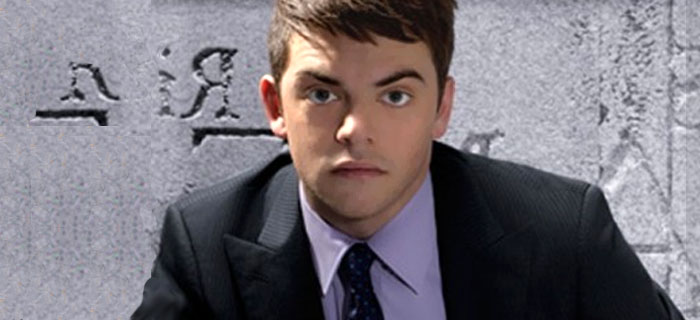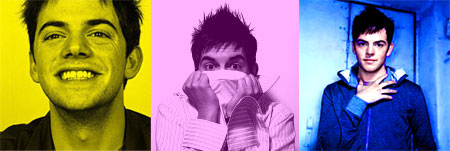This story originally appeared in the May 2012 digital edition of Great Design.
Interview by Kelsey Osgood
When Joseph asked me to interview Nico Muhly, my initial reaction was anxiety (though to be fair, that's my initial reaction to a lot of things.) I am, after all, only lightly educated in music composition, and Nico is one of if not the most prolific young contemporary composers out there, having worked with such icons as Phillip Glass and Bjork, in addition to writing myriad pieces on his own. What I came to realize was that while accomplished, Nico is whimsical and humble, willing to give neophytes like me a glimpse inside his process. Nico falls within the realm of great design because of the way he cultivates his inspirations –– drawing on everything from Anglican choir music to an illicit, ultimately fatal Internet encounter ––and constructs a piece of music to be both site-specific and translatable. Creative, original (yep, he did fry an egg on stage once), adorable, accessible and fun. Enjoy! - Kelsey
Q.
You have mentioned that generally, you begin by thinking of the overall structure of a piece of music and then after you've settled that, moving on to the smaller parts of the whole. Is this typical of composers? Did you learn to approach pieces that way, or was it instinctual?
A.
It's kind of learned. I had big structure problems. John Corigliano, my teacher at Juilliard, kicked my ass about it [when I was a student.] Basically I had a million great ideas each of which lasted thirty seconds so I'd kind of line them up in a row without any sense of an overall structure. It's less a question of having a story and more having an itinerary.
Q.
You occasionally incorporate nontraditional musical "instruments" into your pieces (examples include whale fat, human hair, and butcher knives.) How do you decide what particular sounds are necessary in the context, and how do you pick objects that you think, when manipulated, will make the right noise?
A.
A lot of experimentation! All those examples are taken from one piece, though, which was written for the studio. The studio is a different place from the stage. I have fried an egg on stage which was pretty great but in general working with microphones and those things… you can afford to experiment and develop sounds that wouldn't work acoustically.
Q.
Compositionally, which TV show has the better theme music, The Addams Family or The Munsters? Why?
A.
Addams Family because of the snapping, obviously.
Q.
You worked on a piece called "Green Aria" that debuted in 2009 and was possibly the first "scent opera" ever. Can you tell us a little bit about how this piece originated, how it came to fruition, and what the reaction to the Guggenheim performance was?
A.
The short answer is this dude Stuart had this idea and hired me and Valgeir and this outrageous Parfumier called Christophe to make this thing happen. The music and smell elements kind of made total sense to me, I mean, it's just music and smells, but then there was this whole additional technical element to it that, for some, was I think confusing. I don't know. File under "I don't know."
Q.
You've collaborated with many different notable artists who work in many different mediums –– among them, Benjamin Millepied (ballet,) Grizzly Bear (more mainstream music) and on movie soundtracks (The Reader). Do you tend toward collaborations, or do you engage in them because the opportunity arises?
A.
Working solo is the majority of what I, and I think most composers do. Right now I am sitting alone in a hotel room in Amsterdam and I will continue sitting alone in this same hotel room for twelve hours. Last week, I was on the road with Bryce Dessner & Sufjan Stevens in the most insanely collaborative situation you can imagine. So I kind of seek out a contrast. Last week I was pining for this solitude but now that I've been up since six in the morning editing these fucking viola bowings I'm desperate to plunge into somebody else's project.
Q.
When you discuss your work, you talk about the performance space often. Do you write pieces with that in mind? If so, when you think of the work being performed elsewhere (after the initial run, let's say) do you imagine things as lost or gained by the change in venue?
A.
I don't worry too much about things being lost or gained as much as basically tailor-making something for any one situation. Like, a tailored garment is, I think, better than a not tailored one, regardless of for whom it was tailored, if that makes sense. It's specific and weird but you see the evidence of detailed craft. The good news is that a lot of performance spaces are very similar — something that works in Carnegie Hall is going to work in Benaroya Hall and also the Concertgebouw. It's the weirder, more specific places where it gets fun, like the (Park Avenue) Armory...
Q.
How much, if any, attention do you pay pre-composing to the more performative and less musical elements of a piece? The venue, as previously mentioned, or the number of musicians, or the layout of the space?
A.
Well, all of those things come to play. I mean, number of musicians is obviously very important! And who they are… but I let go to pre-composition ideas very quickly. You know that moment when you get to the store and you realize that your plan to make cauliflower is not gonna work but don't those brussels sprouts look good? There's a lot of that, where you plan and plan and then realize that something else is just a better scheme.
Q.
Philip Glass, one of your mentors, famously allowed the audience to wander in and out of the first five-hour performance of "Einstein on the Beach," thus making them part of the performance in a sense. Do you consider the audience an active participant in the performance?
A.
I actually don't. I think there was so much good thought put into that in the 1960's and 70's that I can afford to be more traditional. In that light, I do like writing music for specific use — religious music, in particular, has long been an interest and a kind of idée fixe in my life. Much of the music in the Anglican tradition exists in specific contexts: you take communion during the Agnus Dei, you stand up during the Kyrie, etc. and I like all of that. In terms of applying that stuff to the concert hall, I'm less interested in it personally for me, which isn't to say that I'm not going to march all up and down the aisles of Einstein.
Q.
How much are you drawn to works or ideas because they are challenging? Does pushing the proverbial envelope feel natural or more an act of duty as an artist…or neither, or some combination of the two?
A.
Eh? I don't think about it. Everything's hard and everything's easy. I don't like that whole "I'ma be grouchy about something just to get a reaction." We have Stanley Fish and the New York Times commenters for that.
Q.
Does silence play a role in your life or music?
A.
Yes and yes. I always say that one of the big distinctions between playing music in a classical music space versus a not-classical music space is the huge value assigned to the silence just before and just after a piece of music. I went to a high school where the main performance space was also the main assembly hall for everybody, and as a result you NEVER got the sense of a performance beginning or ending as there was constant clomping around behind and above. I think about that all the time. As for my life, I tend to be stuck in hotels perpetually under construction. Three days ago there was some kind of fistfight under my window? One rather wishes for more silence. I occasionally go up into my momma house in Vermont where it's silent enough until a woodpecker gets involved.
Q.
Do you compose differently when you are in love? Does carnality belong in music?
A.
No, I compose the same no matter what awful shit or great shit is happening to me. As for carnality!
Q.
I believe it was Stephen Sondheim who once said (and I'm paraphrasing here) that composing music is making order out of chaos, taking dissonant notes and arranging them in a clear specific manner. Your thoughts?
A.
Um…I don't know. I don't worry about the kind of philosophical implications of the thing. I've got so much to do, the minute I start worrying about that is the minute I don't have enough to do. Doesn't that make you crazy when people are like "Music is frozen architecture" or whatever, all these weird hallmark statements? Anyway, I love Stephen Sondheim. Are you trying to paraphrase Sunday in the Park? ART ISN'T EASY. COLOR & LIGHT. I can go on all day.
Q.
Musically, whose life would make for a better opera: Brittany Spears or Whitney Houston’s?
A.
Darling, you misspelled Britney .
Q.
How do you know when a piece of music is done? Is it aural, emotional or pragmatic to the situation?
A.
When it's due. Or, like… I mean it's like food. When you serve it.
Q.
Okay, it's just you and your boyfriend/partner driving cross country. Who gets to pick the sounds?
A.
Me!!!
Video: Planetarium, a song cycle
"Saturn" - Sufjan Stevens, Nico Muhly, Bryce Dessner
w/ New Trombone Collective & Navarra String Quartet
Muziekgebouw Eindhoven
"At the front of the stage is Sufjan, center, with two keyboards, a drum machine, four thousand pedals, and some vocal microphones. To his left is Bryce, with some guitars, five thousand pedals. Then I’m on the other side with a piano, a celeste, two keyboards, and no pedals aside from those attached to the instruments. Then, behind Sufjan, a drummer, James (whom everybody told me was raw vegan just to mess with my head) playing a standard kit augmented with MIDI-controlled pads. To his right, a string quartet, and on the other side, seven trombones. Hovering over the drums is a sixteen-foot inflatable orb covered in a sort of skin onto which various images are projected. There are also what look like prison lights surrounding the musicians. " - NicoMuhly.com





